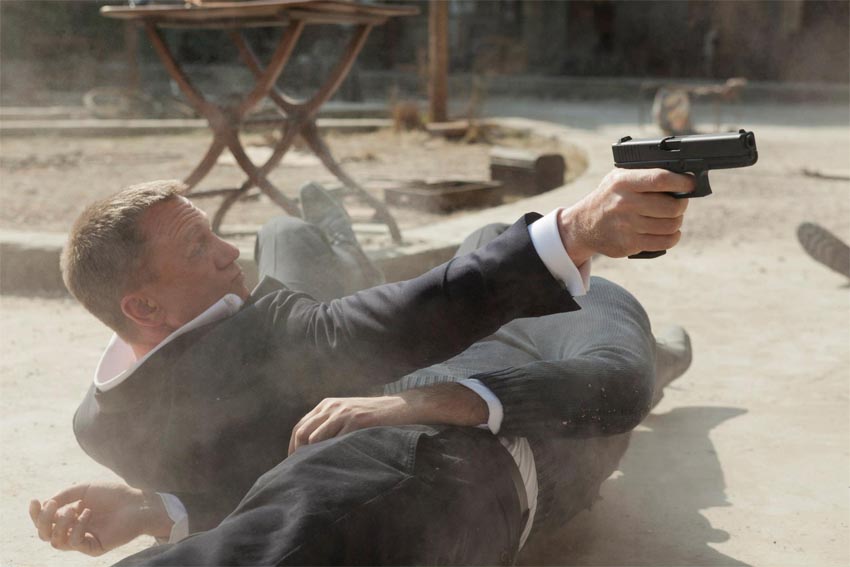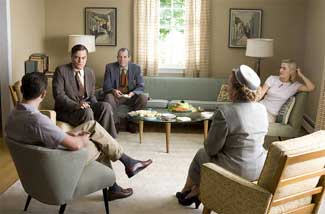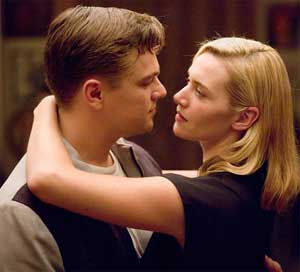The James Bond film series has experienced growing pains during its five decades: the awkward political correctness in the Pierce Brosnan era (Tomorrow Never Dies‘s “Filthy habit!”), Sean Connery’s dubious high-priced return to Diamonds Are Forever for a very silly moon buggy chase scene, the preposterous gadgets in Die Another Day, and the failure to figure out what to do with Timothy Dalton. Quantum of Solace, with its return to convention and its ridiculous title, threatened to attenuate the good will established by the series reboot, Casino Royale.
But I’m pleased to report that Skyfall is a sharp, thrilling, classy, and rich-looking installment announcing a confident trajectory for the Daniel Craig iteration of James Bond. While it’s somewhat alarming to see Craig transform from the new double circle on the block to aging agent in six mere years, he remains an enjoyably chilly and crisp Bond, preferring to unleash his quiet fury when his car is destroyed rather than when the people around him die. He’s good enough to ask about agents who have been killed, but this is more of a functional than a empathic query. He’s willing to rip shards of depleted uranium from his chest to ID a sniper. When given little more than a radio transmitter and a pistol responding to his thumbprint from Q or the family hunting rifle for a final showdown, he’ll make do with the Spartan setup. He’s the James Bond for the “too big to fail” age. If he wasn’t busy strangling henchmen with his legs in icy water, he’d have a bustling career as a corporate efficiency expert.
You could say that Craig’s Bond is the closest to Richard Stark’s Parker. Like Parker, Craig’s Bond is focused and economical, even when he’s holding onto the bottom of an elevator to pursue a sniper. Yet Bond’s commitment to professionalism extends beyond money. He isn’t against vacation. But his duty to his country, perhaps anchored by his reliance on pills and alcohol, hinders him from becoming a full-fledged sociopath. “Orphans make the best recruits,” says M to Bond. And the price for being a double agent is extirpating your need for family. It’s a distinction that former MI6 agent Raoul Silva (Javier Bardem, playing the baddie here), fails to understand, which may be one of the reasons Silva insists on calling M “Mommy.”
We’re informed early on that not everybody can make it out in the field. But while a lesser action film would drop this idea after the handsome actors deliver the details to advance the story, Skyfall actually follows up on this idea throughout its fast-moving two and a half hours. Aside from the many literal missed shots informing the narrative, Skyfall is smart enough to show us M’s poor pistol marksmanship when away from the office. We also see an injured Bond lose his aim after a serious injury (with Silva taking advantage of this later on an island in a very gripping William Tell moment).
Here is a Bond entry in which the best people don’t always make the best decisions on the job. But in Skyfall, there’s the suggestion that real world know-how is no match against technology. It isn’t just the service door that refuses to open in the Underground when there’s an oncoming train. The creative team here understands that Bond has always been steeped in an old world approach. By pitting MI6 against a vengeful hacker who would throw an Ugandan election just for kicks, the human intelligence — the way Bond has worked and seduced a room — that has always buttressed the series is given an intriguing trial. But if being a double agent is “a young man’s game,” there’s surprising adaptability for the old dogs in need of a shave. As Bond tells a man who attempts to seduce him, “What makes you think this is my first time?”
We even get to see M reciting Tennyson’s “Ulysses” during a public inquiry. Beyond this unexpected literary reading (not without precedent, given Simon Raven’s contributions to On Her Majesty’s Secret Service), there’s also an unexpected cameo from an obnoxious CNN anchor. The priapic qualities of the old world may gave us James Bond, but it also saddles us with Wolf Blitzer.
I suspect these sly nuances — which have much to do with John Logan working with the established Neal Purvis and Robert Wade screenwriting team this time around — may cause Skyfall to hold up slightly better than Casino Royale‘s darker edge and Guantanamo Bay-inspired torture scene. While it’s tempting to compare the three Daniel Craig films with Christopher Nolan’s Dark Knight trilogy, Skyfall allows us more room to settle in. It’s possible that the delay in production caused Skyfall‘s creative team to tighten what they had. Because the exciting opening train chase, Silva’s indelible parable of the two rats, and the new Q trying to hide his sneaky work from Gareth Mallory are the types of moments that emerge from artful and well-considered entertainment.
It was also a brilliant move to get Roger Deakins on board as cinematographer. His ambers and umbers give this film the glow of fifty year scotch. There’s one especially coruscating scene in a Shanghai high rise, where Bond dukes it out with a sniper against the dazzling backdrop of endless glass and projected lights from the outside rolling slowly into the dark.
While Adele’s theme song is marvelous, Thomas Newman’s pulsating score is a major disappointment. Newman’s music here seems more at home in a forgettable action movie playing on HBO at three in the morning. I don’t know if John Barry can ever be replaced, but if the Bond films are going to step it up with installments like Casino Royale and Skyfall, then the Broccoli-Wilson team needs a composer to match.
At times, Skyfall is a little too reliant upon Silva’s theatrics, which threaten to overshadow the film’s mild efforts to deepen the relationship between Bond and M. This may be because Silva is one of the best Bond villains in years. When Silva tells Bond about what he did to get where he is today (with director Sam Mendes wise enough to hold this performance in a long take), Bardem instantly commands your attention. But the film flags a bit just before his first appearance, even after it has gone to the trouble to destroy a pivotal base in a gas explosion. We all know that the James Bond films tend to require the bad guys to inform us of their vile plans in person.
But these are pedantic beefs. I enjoyed Skyfall a great deal. I even found myself blurting out “Awesome!” during a particularly sinister exchange between Bond and Silva. And if that is the measure of whether you should see this movie, Skyfall more than lives up.


 Instead of the backstories associated with this disastrous local theater run, we see Leo and Kate (certainly not anything close to Yates’s Frank and April, and considerably removed from Cameron’s Jack and Rose) looking across at each other at a party. But we have no real sense in the film of why these two would be attracted to each other, and, because of this, there’s no real reason to care. It doesn’t help that the Wheeler household looks more like a Pottery Barn catalog than a middle-class dwelling in 1955. And it doesn’t help that Mendes cannot even depict two pivotal acts of carnality with accuracy. (In the Mendes universe, couples have passionless sex and finish each other off in twenty seconds without even the tiniest whimper of pleasure. This is as preposterous and implausible as Sharon Stone’s over-the-top masturbation scene in Sliver. In a narrative that demands close verisimilitude, this is an inexcusable artistic decision.)
Instead of the backstories associated with this disastrous local theater run, we see Leo and Kate (certainly not anything close to Yates’s Frank and April, and considerably removed from Cameron’s Jack and Rose) looking across at each other at a party. But we have no real sense in the film of why these two would be attracted to each other, and, because of this, there’s no real reason to care. It doesn’t help that the Wheeler household looks more like a Pottery Barn catalog than a middle-class dwelling in 1955. And it doesn’t help that Mendes cannot even depict two pivotal acts of carnality with accuracy. (In the Mendes universe, couples have passionless sex and finish each other off in twenty seconds without even the tiniest whimper of pleasure. This is as preposterous and implausible as Sharon Stone’s over-the-top masturbation scene in Sliver. In a narrative that demands close verisimilitude, this is an inexcusable artistic decision.) Leonardo DiCaprio is not that man. He demonstrates little thespic understanding of what it means to be stifled. He gives us nothing in the way of sorrow, save the cartoonish wails and the exaggerated throwing of physical objects from surfaces. DiCaprio has been relying on this ever since a few people convinced him that he was a serious actor. But he is unable to present us with some of the reasons why Frank would be tempted by an extramarital affair. He can access the territory of knowing he’s not good enough to be someone special. But when we learn how Frank Wheeler’s cavalier act gets him ahead, it is not because of DiCaprio. It is because Haythe and Mendes spoon-feed it to us ad nauseum. A scene at a beach, a scene with his co-workers at a diner, a scene with April. This is an inefficient and an insulting waste of minutes. We need not be told twice, let alone three times, that Frank Wheeler has what it takes to get ahead at Knox Business Machines. It should be self-evident in the way that Frank Wheeler acts on screen. But DiCaprio here cannot merge into the tempo established by his environment.
Leonardo DiCaprio is not that man. He demonstrates little thespic understanding of what it means to be stifled. He gives us nothing in the way of sorrow, save the cartoonish wails and the exaggerated throwing of physical objects from surfaces. DiCaprio has been relying on this ever since a few people convinced him that he was a serious actor. But he is unable to present us with some of the reasons why Frank would be tempted by an extramarital affair. He can access the territory of knowing he’s not good enough to be someone special. But when we learn how Frank Wheeler’s cavalier act gets him ahead, it is not because of DiCaprio. It is because Haythe and Mendes spoon-feed it to us ad nauseum. A scene at a beach, a scene with his co-workers at a diner, a scene with April. This is an inefficient and an insulting waste of minutes. We need not be told twice, let alone three times, that Frank Wheeler has what it takes to get ahead at Knox Business Machines. It should be self-evident in the way that Frank Wheeler acts on screen. But DiCaprio here cannot merge into the tempo established by his environment. Instead, Mendes and Haythe, who appear to be a writer-director working team about as competent as Akiva Goldsman and Joel Schumacher, see Yates’s endlessly nuanced novel as an opportunity to remake American Beauty for the 1950s, with a number of sexist nods to Mad Men thrown in for commercial appeal. “I must scoot. Toodle-ooo,” says one bubbly neighbor. And this cornball emphasis suggests that Mendes and Haythe don’t see the 1950s as a time in which real people lived and wrestled with serious decision. It is a decade to be played merely for cheap laughs.
Instead, Mendes and Haythe, who appear to be a writer-director working team about as competent as Akiva Goldsman and Joel Schumacher, see Yates’s endlessly nuanced novel as an opportunity to remake American Beauty for the 1950s, with a number of sexist nods to Mad Men thrown in for commercial appeal. “I must scoot. Toodle-ooo,” says one bubbly neighbor. And this cornball emphasis suggests that Mendes and Haythe don’t see the 1950s as a time in which real people lived and wrestled with serious decision. It is a decade to be played merely for cheap laughs.